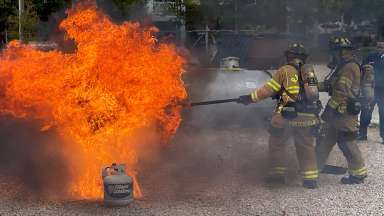In preparation for Thanksgiving, learn how to fry a turkey – without injuring yourself or damaging your property.
“Turkey frying can be dangerous because oil fires happen quickly,” says Deputy Fire Marshall Lemuel Hubbard of the Raleigh Fire Department.
Chief Brian Taylor, State Fire Marshal, agrees. “Thanksgiving is all about bringing people together, and we don’t want a preventable fire to interrupt that. If you’re frying a turkey this year, take your time, stay alert, and follow the safety steps. A few simple precautions can make sure your family enjoys the day safely.”
According to the National Fire Protection Association, Thanksgiving Day is the peak day for fires caused by cooking – about 1,000 home fires occur on that day. “Make sure to plan for fire safety especially when cooking this holiday season,” Hubbard says.
Safety Tips for Frying a Turkey
Follow these safety tips for frying turkeys:
- Use extreme caution when cooking with oil. Hot oil can spill or splash onto the flame, igniting a fire. Also, oil inside a turkey cooker pot can stay dangerously hot for hours after use.
- Don’t overheat the oil. Cooking oil, if heated beyond its cooking temperature (375 degrees), can ignite.
- Always operate turkey fryers outside. They should not be used under a garage, deck, breezeway, porch, barn, or any structure that can catch fire.
- Make sure the turkey has thawed completely before putting it in a turkey fryer. Frozen, or partially frozen turkeys, will cause hot oil to splatter or produce hot steam, which leads to burns.
- NEVER use water to extinguish a grease fire!
Safety Demonstration Scheduled for Nov. 21
RFD and N.C. Office of State Fire Marshal are scheduled to host a live turkey frying demonstration for the media on Friday, Nov. 21, at 12:15 p.m. at the Keeter Training Center to show the dangers of frying a bird that’s not fully thawed.
Don’t Pour Grease Down the Drain – Use Our Collection Service!
After you’ve safely fried your turkey, dispose of the oil the right way – don’t pour it down the drain.
Pouring fats, oils and grease down the drain is a top cause of sewer overflows. When you dispose of cooking oil and other fats in sinks and toilets, they enter the sewer system and can clog pipes. So-called “fatbergs” form, blocking pipes and causing sewer overflows.
The City of Raleigh provides its annual holiday cooking oil and grease collection program. Learn more about this free service.
